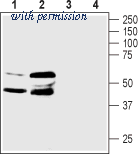product summary
Loading...
company name :
Alomone Labs
product type :
antibody
product name :
Anti-Prostaglandin E Receptor EP3 (PTGER3) Antibody
catalog :
APR-065
clonality :
polyclonal
host :
domestic rabbit
conjugate :
nonconjugated
clone name :
NA
reactivity :
human, mouse, rat
application :
western blot, immunohistochemistry
more info or order :
citations: 2
| Reference |
|---|
image
image 1 :

Western blot analysis of rat kidney (lanes 1 and 3) and pancreas (lanes 2 and 4) membranes: - 1,2. Anti-Prostaglandin E Receptor EP3 (PTGER3) Antibody (#APR-065), (1:200).3,4. Anti-Prostaglandin E Receptor EP3 (PTGER3) Antibody, preincubated with Prostaglandin E Receptor EP3/PTGER3 Blocking Peptide (#BLP-PR065).
product information
CAT :
APR-065
SKU :
APR-065-CF_0.2 ml
Product Name :
Anti-Prostaglandin E Receptor EP3 (PTGER3) Antibody
Group Type :
Antibodies
Product Type :
Antibodies
Clonality :
Polyclonal
Accession :
P34980
Applications :
IFC IHC WB
Reactivity :
Human Rat Mouse
Host :
Rabbit
Blocking Peptide :
BLP-PR065
Homology :
Mouse, human - identical
Formulation :
PBS pH7.4
isotype :
Rabbit IgG
Peptide confirmation :
Confirmed by amino acid analysis and mass spectrometry
Reconstitution :
0.2 ml double distilled water (DDW).
Antibody Concentration After Reconstitut ... :
1 mg/ml
Storage After Reconstitution :
The reconstituted solution can be stored at 4°C for up to 1 week. For longer periods, small aliquots should be stored at -20°C. Avoid multiple freezing and thawing. Centrifuge all antibody preparations before use (10000 x g 5 min).
Preservative :
No Preservative
Immunogen Location :
2nd intracellular loop
Label :
Unconjugated
Storage Before Reconstitution :
The antibody ships as a lyophilized powder at room temperature. Upon arrival, it should be stored at -20°C
Shipping and storage :
Shipped at room temperature. Product as supplied can be stored intact at room temperature for several weeks. For longer periods, it should be stored at -20°C
immunogen source species :
Mouse
Sequence :
(C)RAPHWYASHMKTR, corresponding to amino acid residues 137-149 of mouse prostanoid EP3 receptor
Product Page - Scientific background :
Prostaglandin is a small molecule produced from arachidonic acid by the enzymes COX1, COX2 and PG synthase. PGE2 regulates various factors of inflammatory response, promoting local vasodilatation and attracting immune system cells to the site of the inflammation.Prostanoid EP3 receptor, a member of the G-protein coupled receptor superfamily, is one of four PGE2 receptors (EP1-EP4) and binds PGE2 with a higher affinity than other receptors of its class. Unlike EP2 and EP4, EP3 is not coupled to Gs and lacks cAMP activating functions. In contrast, most of its splice variants couple with Gi and inhibit adenylate cyclase activity1. EP3 binds prostaglandin in a GTP dependent manner. One of the receptor's extracellular domains, ECII, can alter GTP effect on agonist binding and thus the receptor's downstream intracellular signaling. ECII causes receptor conformational changes2.EP3 plays a role in pulmonary hypertension (PAH) pathophysiology. It is hypothesized that EP3 levels are upregulated in pulmonary arterial smooth muscle cells and in human distal pulmonary arteries in response to hypoxia. Blocking agents for the EP3 receptor may prove as a useful strategy in the treatment of PAH3.EP3 is also involved in the cell growth, invasion and migration of many tumor types including bladder cancer. EP3 has been found to be significantly less expressed in muscular and non-muscular invasive bladder cells than in normal urothelial cells4.
Applications may also work in :
IFC IHC WB
Supplier :
Alomone Labs
Target :
Prostaglandin E2 receptor EP3 subtype, PGE2 receptor EP3 subtype, Prostanoid EP3 receptor
Short Description :
A Rabbit Polyclonal antibody to the Prostanoid EP3 Receptor
Long Description :
Anti-Prostaglandin E Receptor EP3 (PTGER3) Antibody (#APR-065) is a highly specific antibody directed against an epitope of the mouse protein. The antibody can be used in western blot and indirect flow cytometry applications. It has been designed to recognize EP3 receptor from rat, mouse, and human samples.
Negative Control :
BLP-PR065
Positive Control :
NA
Synonyms :
Prostaglandin E2 receptor EP3 subtype, PGE2 receptor EP3 subtype, Prostanoid EP3 receptor
Lead Time :
1-2 Business Days
Country of origin :
Israel/IL
Applications key :
CBE- Cell-based ELISA, FC- Flow cytometry, ICC- Immunocytochemistry, IE- Indirect ELISA, IF- Immunofluorescence, IFC- Indirect flow cytometry, IHC- Immunohistochemistry, IP- Immunoprecipitation, LCI- Live cell imaging, N- Neutralization, WB- Western blot
Specifictiy :
PTGER3
Form :
Lyophilized powder. Reconstituted antibody contains phosphate buffered saline (PBS), pH 7.4.
Comment :
Contact Alomone Labs for technical support and product customization
Species reactivity key :
H- Human, M- Mouse, R- Rat
Is Toxin :
No
Purity :
Affinity purified on immobilized antigen.
UNSPSC :
41116161
Cited Application :
IHC
Clone :
NA
Standard quality control of each lot :
Western blot analysis
Antigen preadsorption control :
1 µg peptide per 1 µg antibody
Application Dilutions: Immunohistochemis ... :
1:1000
Application Dilutions: Western blot wb :
1:200-1:400
more info or order :
company information

Alomone Labs
Jerusalem BioPark (JBP), Hadassah Ein Kerem
P.O. Box 4287
Jerusalem 9104201
P.O. Box 4287
Jerusalem 9104201
info@alomone.com
http://www.alomone.com972 2 531 8002
headquarters: Israel
related products
browse more products
questions and comments
